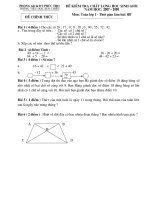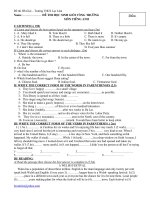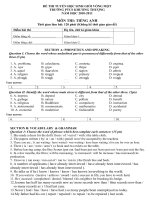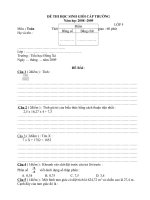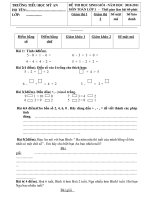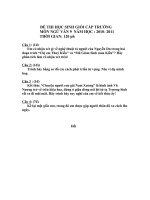DE THI HS GIOI TRUONG VONG 1
Bạn đang xem bản rút gọn của tài liệu. Xem và tải ngay bản đầy đủ của tài liệu tại đây (117.7 KB, 5 trang )
ĐỀ THI TUYỂN HỌC SINH GIỎI VÒNG MỘT
TRƯỜNG PTCS KHƯƠNG THƯỢNG
NĂM HỌC 2010-2011
MÔN THI: TIẾNG ANH
Thời gian làm bài: 120 phút (Không kể thời gian giao đề)
Điểm bài thi Họ tên, chữ kí giám khảo
Điểm bằng số: …………………… Giám khảo 1: ………………………..
Điểm bằng chữ: ………………….. Giám khảo 2: ………………………..
SECTION A: PHONETICS AND SPEAKING
Question I. Choose the word whose underlined part is pronounced differently from that of the other
three.(5 pts)
1. A. problems B. calculators C. contests D. engines
2. A. tow B. grow C. throw D. poet
3. A. equal B. sleeveless C. region D. ethnic
4. A. religion B. ringgit C. primary D. tropical
5. A. plough B. tough C. enough D. rough
Your answer:
1. 2. 3. 4. 5.
Question II. Identify the word whose main stress is different from that of the other three. (5pts)
6. A. impress B. depend C. city D. abroad
7. A. garbage B. nature C. pollute D. benefit
8. A. religious B. Buddhism C. compulsory D. instruction
9. A. instrumental B. communicate C. mathematics D. accidental
10. A. economic B. modernize C. fashionable D. poetry
Your answer:
6. 7. 8. 9. 10.
SECTION B: VOCABULARY & GRAMMAR
Question 1: Choose the word of phrase which best complete each sentence: (15 pts)
1. She made a dress for the doll ( from / of / out of / with ) the table cloth.
2. The papers written ( by/ in / on / with ) pencil won’t be accepted by the teachers.
3. There you are , I ( am waiting / have waited / was waiting / have been waiting ) for you for over an hour.
4. There ( is / are / were / aren’t ) a book and two rulers on the table.
5. Before leaving camp, the Boy Scouts (put out /had been put out /have put out /were put out) the fire.
6. In a few months, the film ( will be increasing / is increased / will be increase / has increased) its
production.
7. I have to ( run away / run out of / run to / run in ) the finish line and back.
8. A number of applicants ( have already interviewed / have already been interviewed / has
already interviewed / has already been interviewed ).
9. He talks as if he ( know / knows / knew / has known )everything in the world.
10. If you want to (receive / achieve / award / earn ) success in life, you have to work hard.
11. He ( accused / complained / denied / blamed ) his neighbor for breaking his hedge.
12. Jerome has half (as many records now as/ more records now than / litter records
now than / so many records as ) I had last year.
13. Never ( had / has / have / have had ) so many people been unemployed as today.
14. My father had his car ( repair / repaired / to repair / to be repaired ) last week.
15. ( When / If / Although / Unless) he tries his best, he will fail his driving test.
Question II: Put each verb in brackets into an appropriate form: (10 pts)
1. I bought a double tickets for concert yesterday. I (go)…………….the concert with my mother
tonight.
2. He wishes that he (work)……………………harder but it’s too late now.
3. Hardly he (take).............................. up the book when the phone (ring)...................................
4. Were I your age, I (do)………………..………differently.
5. That was a very strange question (ask) .............................. .
6. Who (drive) ............................. the car at the time of the accident?
7. Laura (miss) ....................... the party because she (not / tell) ......................... about it.
8. Paul really didn’t mind (surprise) ....................... by the party to celebrate his fortieth birthday.
Question III: Read the text below. Use the word given in capitals at the end of each line to form a
word that fits in the space in the same line: (10 pts)
KIDS WATCH MORE TV
A study into children’s television (0) viewing habits reveals
that children whose parents have a high level of (1) ……….
tend to watch less television than children from less educated
family (2) …………….. . The report also suggests that a high
rate of TV watching among children in poorer (3) ..………….
areas and in provinces, compared to those living in large
urban centers, is often due to (4) ………………. and a lack of
other kinds of (5)………………… in the area. Disco, cinema,
theatre and sports (6) ………...……… offer children in urban
centers a wide range of pastimes, which leads to far
(7)……………………..….. hours being spent in front of box .
(8)…………….., comedies and adventure films are children’s
(9) ………………. programs, while twenty percent of children
said they preferred (10)…………………….. films and thrillers.
VIEW
EDUCATE
BACK
SUBURB
POOR
ENTERTAIN
ACTIVE
FEW
COMMERCE
FAVOR
VIOLENCE
SECTION C: READING
Question I: Read the text and choose the best answer to fill the blank (15 pts)
THE FASTEST DINOSAURS
According (1) ………………… computer models that were used to estimate the running speeds of
dinosaurs, the Tyrannosaurus Rex would have been able to outrun a footballer. The study shows that the
dinosaur could reach a top (2)……………….. of 8 meters a second, which is (3)……………….. faster
than the average professional footballer. There has been a lot of controversy (4) …………………
whether the Tyrannosaurus Rex was a predator or a scavenger; some believe that its highly developed
sense of smell indicates that it was a scavenger, (5) ……………………… others say that its keen
eyesight shows that it was a hunter. The (6) …………….. group will appreciate the recent study, as a
hunter is more (7)………………….. to require such speed.
The University of Manchester study used a powerful supercomputer to calculate the running speeds of
five-eating dinosaurs and used data taken (8) …………….. from dinosaurs fossils, (9) ……………….
Than referring to previous work on modern animals. The Tyrannosaurus Rex, (10) …………………..,
was not the fastest dinosaur. A small dinosaur (11) ………………… Compsognathus, which was about
the (12) ………………… of a chicken, could run at 18 meter second, (13) ………………….. is faster
than the ostrich, the fastest two-legged animal today. It could run 100 meters in a little over six seconds,
which would (14) ………………… modern Olympic (15) ………………… more than a third of the
track behind.
1.
A. with B. as C. to
D.
∅
2.
A. fast B. speed C. swift D. rate
3.
A. fractions B. fractional C. fractionally D. fractional
4.
A. about B. as C. at D. to
5.
A. since B. while C. however D. as
6.
A. former B. later C. latest D. first
7.
A. likely B. probable C. probably D. possible
8.
A. directs B. direction C. directed D. directly
9.
A. instead B. rather C. other D. better
10.
A. therefore B. hence C. since D. however
11. A. called B. named as C. known
D. name
12. A. shape B. size C. form
D. same
13. A. who B. that C. when
D. which
14. A. leave B. chase C. run
D. beat
15. A. athlete B. athletic C. athletics
D. athletes
Question II: Read the following passage and answer the questions: (5 pts)
The world’s oceans are so vast that they can cope with the present levels of pollution. However, little is
known about the long-term effects of such slow poisoning. The most serious problem of modern time is
that man is destroying the earth’s natural resources and transforming huge areas into waste land. As a
result, it is becoming extremely difficult to grow enough to feed the world’s rapidly increasing
population. A way of protecting all wild life on the earth must also be found as many species are in
danger of disappearing completely from the face of the earth. The smoke in the atmosphere, for example,
is creasing so much that the amount of sunlight has been reduced in many cities. Man’s whole
environment is being changed in a serious way.
Questions:
1. What is the process of making something dirty?
……………………………………………………………………………………………….
2. Find a word or phrase from the passage with the same meaning as the air, water and land in which
we live?
………………………………………………………………………………………………..
3. What is the air surrounding the earth called?
………………………………………………………………………………………………..
4. What could be best replaced wealth, goods or products people can use?
………………………………………………………………………………………………..
5. What is a difficulty which needs attention and thought?
……………………………………………………………………………………………….
SECTION D: WRITING
Question I: Finish the second sentence in such a way that it means exactly the same as the first one.
(10 pts)
1. Her friend came and saw her in hospital, which was kind.
It was kind……………………………………………………………………………………………………………………………………
2. Nobody left the party before me.
I was……………………………………………………………………………………………………………………………………………….
3. “Don’t break the doll, John, or I’ll scream,” said Mary.
Mary threatened……………………………………………………………………………………………………………………………
4. Can you describe him to me?
What………………………………………………………………………………………………………………………………………………?
5. He lives far from his parents. He misses them very much.
The farther………………………………………………………………………………………………………………………………………
6. It is a pity you didn’t tell me earlier.
I wish………………………………………………………………………………………………………………………………………………..
7. The teacher started to write the lesson plan right after he turned home.
Hardly………………………………………………………………………………………………………………………………………?
8. You can talk all you want, but I never believe you.
Nothing you say………………………………………………………………………………………………………………………………
9. Rita doesn’t realize how serious her husband’s operation is going to be.
Little…………………………………………………………………………………………………………………………………………………
10. Driving at that speed is dangerous on this road, whether you are an experienced driver or not.
However…………………………………………………………………………………………………………………………………………..
Question II: Use the following sets of words or phrases to write complete sentences.(5 pts)
1. I /be used / get up early / so / not mind / leave / 5 o’clock / morning.
…………………………………………………………………………………………………
2. She / be / good / singer / that / she / ask / join / band.
…………………………………………………………………………………………………
3. Jane / promise / keep / touch / us / while / she / be / Australia.
…………………………………………………………………………………………………
4. Despite / leave / home / early / we / miss / beginning / film.
…………………………………………………………………………………………………
5. They / have / dog / look / neighbor / whenever / they / go / holiday.
…………………………………………………………………………………………………
Question III: Write an essay on the following topic: (150-200 words)(20 pts)
Do you agree with the following statement?
“Practice is a good way of improving your English.”
Use specific reasons and examples to support your opinions.
…………………………………………………………………………………………………………………………………………………………………………………
……………………………………………………………………………………………………………………………………………………………………………
…………………………………………………………………………………………………………………………………………………………………………………
……………………………………………………………………………………………………………………………………………………………………………
…………………………………………………………………………………………………………………………………………………………………………………
……………………………………………………………………………………………………………………………………………………………………………
…………………………………………………………………………………………………………………………………………………………………………………
……………………………………………………………………………………………………………………………………………………………………………
…………………………………………………………………………………………………………………………………………………………………………………
……………………………………………………………………………………………………………………………………………………………………………
…………………………………………………………………………………………………………………………………………………………………………………
……………………………………………………………………………………………………………………………………………………………………………
…………………………………………………………………………………………………………………………………………………………………………………
……………………………………………………………………………………………………………………………………………………………………………
…………………………………………………………………………………………………………………………………………………………………………………
……………………………………………………………………………………………………………………………………………………………………………
…………………………………………………………………………………………………………………………………………………………………………………
……………………………………………………………………………………………………………………………………………………………………………
………………………………………………………………………………………………………………………………………………………………………………
…………………………………………………………………………………………………………………………………………………………………………………
…………………………………………………………………………………………………………………………………………………………………………………
…………………………………………………………………………………………………………………………………………………………………………
…………………………………………………………………………………………………………………………………………………………………………………
……………………………………………………………………………………………………………………………………………………………………………

